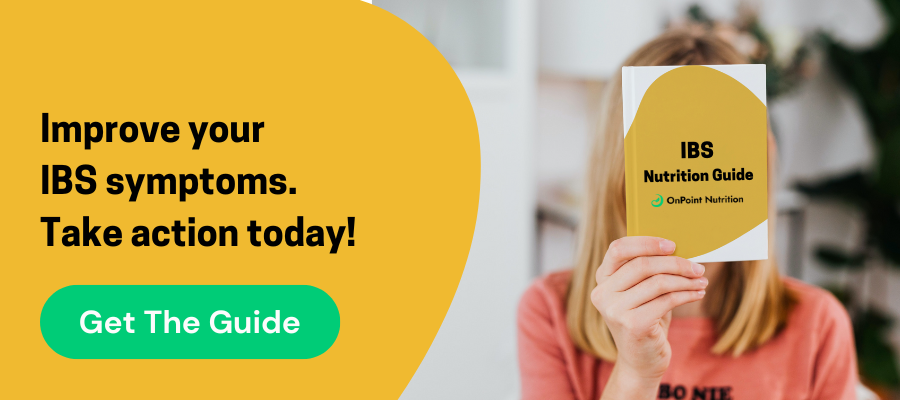
If you’ve been diagnosed with IBS, your doctor may recommend working with a dietitian. You might be wondering how exactly a dietitian can help with IBS. Well, everyone's IBS is different, which means that the tactics you use to manage your IBS should be unique and customized. That's where we come in!
OnPoint's approach to IBS management is backed by the latest scientific evidence and has helped hundreds of clients reach their health and wellness goals. And since we are a 100% virtual practice, there’s no need to drive to a local provider. We are probably the closest IBS dietitian near you! All of our meetings are delivered virtually, which means you can work on your health goals from the convenience of your own home.
Here is the full rundown of how our IBS dietitians work to help clients manage their IBS:
Step 1: Assessment
Each person's IBS is triggered by different things and manifests through different symptoms, so the "treatment" for each person's IBS must be tailored to the individual. Before working with a nutrition professional, make sure you are up to date with your physician visits and blood work to rule out any other possible GI-related conditions. The goal of IBS management is to reduce the frequency and severity of IBS symptoms. In order to do this, we must first identify the characteristics of your specific IBS.
Characteristics include:
Step 2: Program Personalization
You and your IBS dietitian will discuss how much is already known about your IBS to determine the ideal approach. Based on this information, your dietitian will create personalized materials to help guide you through the process. Throughout your program, we will structure your meal planning guides and weekly goals to help uncover your IBS triggers and better manage your condition.

When it comes to IBS, our team takes a few different approaches:
- Symptom Management: This approach is best suited for the client who already has an idea of their IBS triggers and is able to identify their specific IBS-related symptoms. Your IBS dietitian will create a personalized meal planning guide for you taking into consideration known trigger foods, overall nutrient needs, and of course, food preferences. Your sessions will be geared towards lessening exposure to trigger foods, meeting nutrient needs, and modifying any other lifestyle-related factors that impact your IBS and overall nutrition.
- Symptom Tracking: This approach is best suited for the client who has suspicions of their IBS triggers and related symptoms, but is not sure of what they may be. Using this approach, your IBS dietitian will create materials that include foods recognized as safe for IBS but still include the foods you enjoy and eat frequently. You will then track your IBS symptoms and food intake to allow your dietitian to identify patterns and connections between certain foods and your IBS symptoms. This approach helps reveal your specific IBS triggers and information that can be used to personalize a long-term approach to keeping your IBS symptoms at bay.
- Elimination Diet: The elimination diet is best suited for the client who is ready to take a more aggressive approach to determining trigger foods. The goal of an elimination diet is to completely eliminate all potential trigger foods for a certain period of time until you're experiencing no IBS-related symptoms. Once this baseline is achieved, under the direction of your IBS dietitian, you will reintroduce foods one at a time and monitor for symptoms. You will continue to do this until you've cycled through all potential trigger foods. Your IBS dietitian will then create specialized materials to help outline a long-term approach to meet your nutrient needs and live symptom-free.
Step 3: Monitor outcomes
Research suggests the best way to achieve long term results is through sustainable dietary changes. Throughout your program, your IBS dietitian will monitor your progress to ensure your program is serving you well. We will be on the lookout for changes in symptoms over time and any potential ways to increase success. These outcome measures help us determine the direction of your plan moving forward and how to best prepare you to manage your condition long term.
Client Success
Want to hear about a client who successfully learned out to manage their IBS by working with our team? John, just like many other clients, has experienced long term IBS relief through working with our IBS dietitians. Stop looking for a dietitian near you and start working with one of our IBS dietitians from the comfort of your own home!
Click the picture below to check out John's story!
To read more about foods to avoid, foods to eat and how to make easy changes to your IBS diet to mitigate your symptoms, download our IBS Nutrition Guide.
Topics

Kaitlyn Willwerth is a Registered Dietitian at OnPoint Nutrition. Kaitlyn's work focuses on providing individualized health and lifestyle coaching and, most importantly, support. She is a Certified LEAP Therapist and has also completed the Monash University 'Low FODMAP Diet for IBS' online training course for health professionals.





